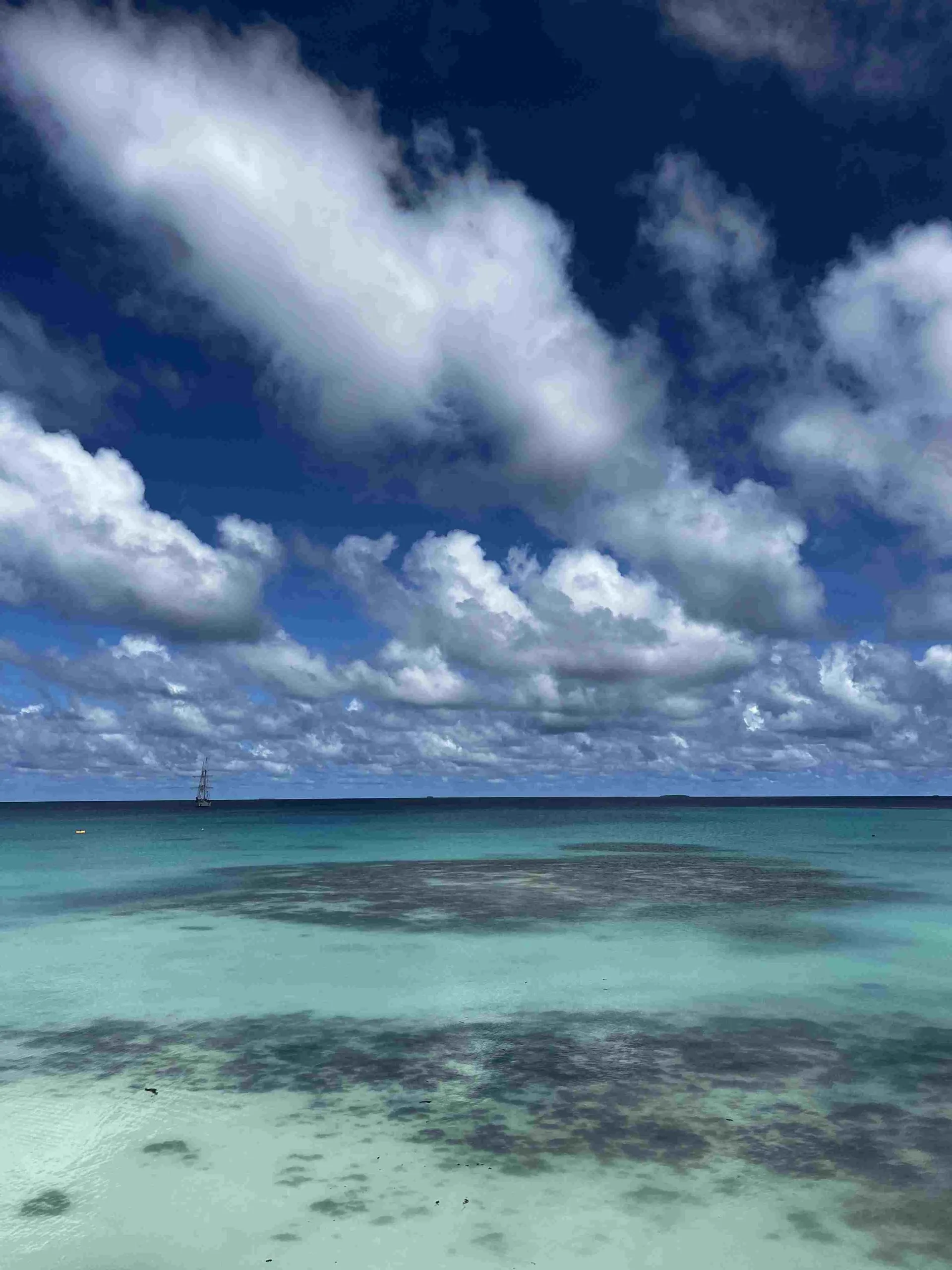Programs Blog
Swim Calls in Tuvalu!

Author: Satya Advani, Colorado College
Ship’s Log
Date: October 13, 2023Time: 13:00Location: 8˚ 26.343’ S 179˚ 09.747’ EWeather: Wind ESE Force 4, 30.5˚ C, Cumulus covering 3/8 of the sky
Hi all, Satya here to report on a special segment of life devoted to takingin all the love and knowledge that our watery planet has to offer. As I amstarting to write this post many of our shipboard comrades have begunplunging from the bow into the warm and unbelievably blue and turquoiselagoon of the atoll nation of Tuvalu.
The slated goal for this post is to provide some insight into theweather phenomena we have been experiencing recently, so I will begin thereand then speak a bit more about life aboard the ship and this new place wehave all just begun to explore.
In general, we have been bearing witness to the low-pressure nature ofthese lower latitudes; driven by high solar irradiance near the equator,there is an excess of warm air that rises and is soon replaced by coolerdenser air from higher latitudes. As this warm sea-born air rises, it soonreaches the lifting condensation level – the altitude at which condensationoccurs as a result of reduced atmospheric pressure. This condensationresults in often impressive cloud formation and resultant frequentprecipitation. Thus, our northward approach into Tuvalu over the last fewdays would be best characterized by a baseline of quite sticky, warmconditions dotted with the occasional drenching squall.
It is pretty interesting to consider that the amount of rainfall at theselow latitudes is so great that the top bit of the water column exhibits alow salinity fingerprint of this phenomenon due to the effective dilutionof the seawater. It is this heavy precipitation that allows the people ofthis region to survive despite the extremely limited water table.
The combination of all this cloud formation and a near constantunobstructed view of the horizon has made for some truly heart-tuggingsunsets, complete with those holy sunbeams known as crepuscular rays.Crepuscular rays are formed by sunlight escaping from between clouds andleaping across the sky; as one might expect, they have a counterpart, theanti-crepuscular rays – these are the shadows cast by the same clouds andare seen as large swaths of darkness stretching across the sky. At timesthese patches can be dark enough that stars are visible during the day,providing a unique opportunity for celestial navigation. To my knowledge astrong example of anti-crepuscular rays has yet to be observed on this tripbut we’ve seen hints of these cloud shadows. During our transit from Fiji to Tuvalu quite an ethicalconversation arose surrounding the catching of fish. When thesailing/science deployment situation allows for it, we have been trailingtwo handlines, trying out various lures – poppers, squid skirts, and spoons– in the hope of landing a few of these ocean friends. Before the firstfish – a small tuna — was caught, a few of us had agreed to throw thefirst one back as a thank you to the ocean, as an act of gratitude. Butonce that powerful lively little fish was back in the deep blue and thedeck a sanguine hue, a critical conversation of whether this was the rightmove began to surface. This notion of giving back to the ocean, to motherearth as a whole, of demonstrating care by sparing a life, had come from agood place – but was this really the caring act we had hoped it would be?Was sinking a sharp piece of steel into the jaw of a creature in order tohaul them aboard and toss them back really an act of love? At this point Iwould say it is not. Perhaps such a feeling of care and stewardship shouldmanifest in other ways. I think the conclusion many of us came to is thatdespite our seemingly endless supply of dry stores, we are fishing to eat,and if we don’t intend to eat nearly everything that ends up laying on thequarterdeck with a hook in its mouth, the lines should stay out of thewater. That all being said, there is a good argument for releasing smallerfish to allow growth towards a mature reproductive individual. Unless onereally needs to eat, nothing is black and white.
I’m sure further discussion surrounding these ethics will ensue; may thissimply be the first installment of thoughtful engagement with the bounty ofthe natural world.ShoutoutsMom – As I lay floating on my back in the unimaginably blue waters of thisatoll lagoon, I have certainly been channeling all the great energy youbring into this world. I hope you have found some watery happy places oflate.
All the real ones: you know who you are – sending best wishes to each ofyou and all your current endeavors. Can’t wait to share some great stories.Soraya: Ma vi mantas! They were so beautiful y pense en ti. Te amo rayita –Soleil
Recent Posts from the Ships
- Ocean Classroom 2024-A collaborative high school program with Proctor Academy
- Collaborations and Long-term Commitments: SEA’s Caribbean Reef Program Sets a Course for Coastal Programs that Compliment Shipboard Experiences.
- Sea Education Association students prepare for life underway using state of the art nautical simulation from Wartsila Corporation.
- SEA Writer 2022, Magazines From the Summer SEA Quest Students
- Technology@SEA: Upgrades Allow Insight into Ocean Depths
Programs
- Gap Year
- Ocean Exploration
- High School
- Science at SEA
- SEA Expedition
- SEAScape
- Pre-College
- Proctor Ocean Classroom
- Protecting the Phoenix Islands
- SPICE
- Stanford@SEA
- Undergraduate
- Climate and Society
- Climate Change and Coastal Resilience
- Coral Reef Conservation
- Marine Biodiversity and Conservation
- MBL
- Ocean Exploration: Plastics
- Ocean Policy: Marine Protected Areas
- Oceans and Climate
- Pacific Reef Expedition
- The Global Ocean: Hawai'i
- The Global Ocean: New Zealand